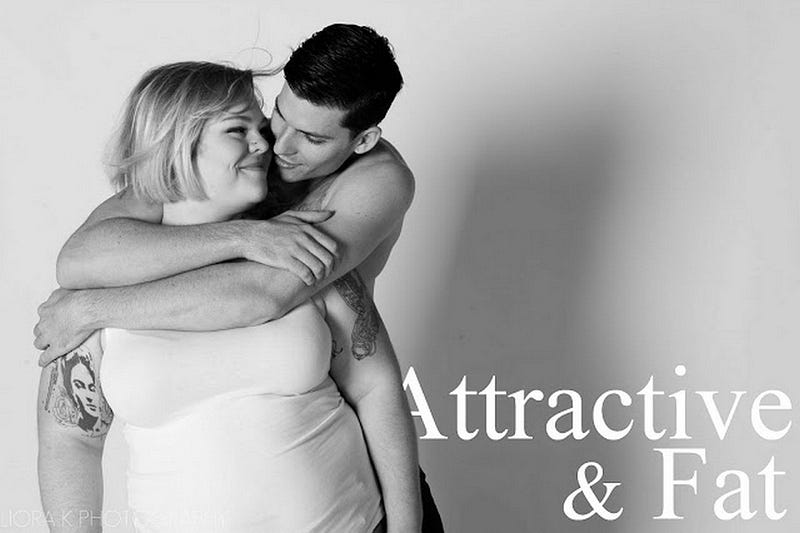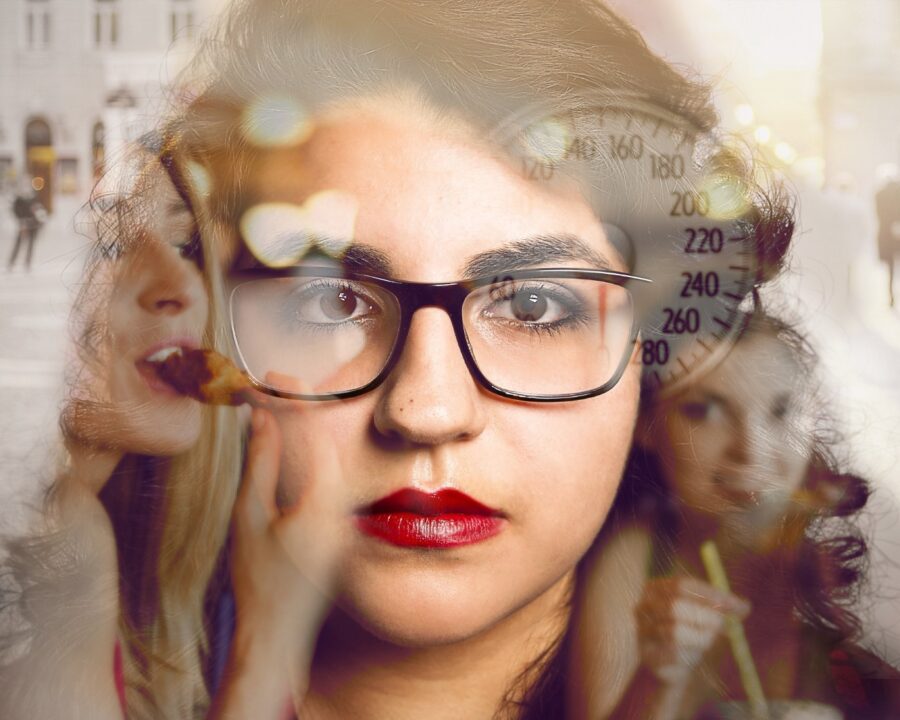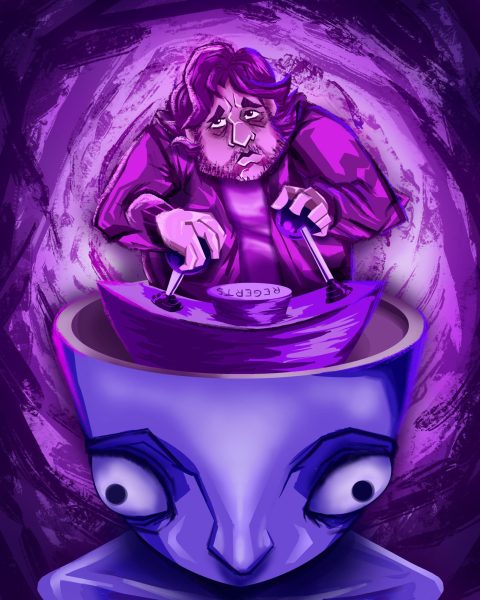Everyone is Beautiful
Except Me. I’m Fat.
Photo illustration by Allan Gonzalez and Jackie Rodriguez
When I was in the fifth grade, my teacher noticed that I stayed after school every day to write down what was on the board. When she asked why I did not write everything down as she instructed, I explained that it was because I couldn’t see it clearly from my seat. The school called my parents that day and made a strong recommendation that I see an optometrist. I have two astigmatisms, one in each eye and I am dramatically near sighted, which means that while my vision up close is absolutely fine, everything from about five to ten feet away blurs. I walked around for 10 years of my life seeing everything as blurred figures and dim shapes. The first time I put on my glasses, I swear, the world became clearer. Everything was brighter, more vivid, and more beautiful than I had ever seen. The experience was, literally, eye opening. The strangest part wasn’t that I had needed glasses that whole time, but rather that I had assumed everyone else saw the way I did. I never once considered that there was something wrong with my vision.
That’s sort of how I feel about having once been fat. I was unaware of how horribly people treated me while I was fat until after I lost weight. My low self-esteem, lack of confidence, and just all around self-bashing had given me “bad vision” all over again. I didn’t notice their spiteful comments, backhanded compliments, hurtful words, and lingering stares because no matter how awful their treatment of me was, I was worse to myself. I hated my body. I hated myself. How could I possibly recognize that other people didn’t have the right to look at me and see me as disgusting, when I too, saw the same thing? I just assumed that I was disgusting because that’s how I felt about myself and that’s what people around me seemed to reinforce.
I was miserable. And I thought losing the weight would make me happier.
For Amanda Arthur, a kinesiology major at Norco College in Southern California, comparing herself to other people and wanting to be like them is cause for unhappiness. “You constantly compare yourself to other people and you just look at yourself and you’re not happy. You just get to this point where you’re just done and you just want to start a new life,” Arthur said. Arthur lost over 80 pounds last year, and said that while she was never really unhappy about her size, she wasn’t happy either.
So, you lose the weight. Whether it be through extreme exercise, a restrictive diet, or a combination of the two, you do whatever it takes.
At least that’s what I did. I worked my ass off, starved myself, and lost over forty pounds before hitting a plateau. For months, no matter how hard I exercised or how little I ate, the numbers on my scale refused to budge. I struggled with my feelings of inadequacy all over again. And as strange as it sounds, now that I had lost the weight, my self-destructive tendencies were even worse than before. I still wasn’t good enough. I had lost a bunch of weight but I was by no means thin. I wasn’t anywhere close to being able to wear the bikini I had hanging next to my mirror as “encouragement.” I still didn’t feel comfortable in my clothes. I still hated the sight of my body. Perhaps I hated it even more now because areas that had once been tight were now occupied by excess skin and extra flab.
But even though I hated my current body, the idea of going back to my old “fatter” body was utterly terrifying. I had made a promise to myself that I would never go back. Yet, I couldn’t move forward. I was stuck.
The weight loss did nothing for my self-confidence. It was during this awful period while I was stuck between not fat and nowhere near thin that I finally realized some soul searching was in order. My weight loss journey was far from over, but it was then that I realized that just losing the weight was not going to be enough to undo all of the negative things that I thought about myself or restore my self-esteem and confidence.

So, I started trying various positive thinking techniques. I read the works of body-loving activists like bloggers Jes Baker and Meghan Tonjes. I tried to rebuild what I had, for the past several years, been destroying.
When I just started to like myself, I began to realize how much the rest of the world hadn’t. Just like putting on the glasses in fifth grade, I started to see what the world and the people in it really looked like.
While I was fat, people judged me. They saw just another fat girl who represented a standing statistic of fat girls and obesity in America.
I was a fat girl going through several pairs of pants in the fitting room having to go up four or five sizes before finding some that fit, albeit tightly and uncomfortably. The employee kept bringing in more pants for me to try on while she and her co-worker snickered and said words they thought I couldn’t hear. When these same types of individuals saw me eating a cheeseburger at McDonald’s, they smirked or laughed.
I remember once, a girl once stopped me as I was walking to my table to join my friends after picking up my order.
She said, “Should you be eating that?”
Her tone was low, only loud enough for her friends and me to hear. I froze. For a few seconds, I couldn’t move. I looked over at her and her three thin and beautiful friends to double check that I wasn’t just hearing things. But her face said it all. She looked down at my meal, then back at me, and scoffed. Her friends broke into a fit of giggles, covering their mouths as they laughed at my expense. Five words. It had taken five words to tear down my spirit, eliminate my hunger, and destroy my confidence.
The worst part was, it was okay for them to do so. Society has taught them that being fat is disgusting. Fat people were disgusting. So when they saw me, that’s what they saw. They saw a fat girl. They didn’t see me.
Arthur notes that while no one ever directly teased her about her size, the fact that she was “bigger” went from being a description to being the first things people noticed about her.
“She’s pretty but she’s bigger. That’s what people would say about me. It’s always thrown in there when you’re bigger,” she said.
Arthur added that a person’s weight is the first thing that people see.
“It’s the first thing that comes to mind when you look at somebody. And it’s sad. Everyone’s like that. That’s the first thing they judge.”
In my experience, most people are not as intentionally cruel as the girls in the fast food restaurant. In fact, I now see that some worked almost painstakingly hard to avoid talking about that particular aspect of me. Which, honestly, kind of felt worse than the outright insults. Whenever I would get compliments, it was for my “beautiful eyes” or “gorgeous hair” or the most used “OMG your nails are so pretty!” I remember their reaction to me quite clearly. Whether it was family, friends, or strangers, whenever it came to exchanging the small talk required of a social interaction, they all did the same things: looked at my body, judged it, found my size displeasing, felt obligated to make some sort of compliment, and ended up saying something like, “Nice shoes.” They could only compliment parts of me because they couldn’t compliment me as a whole.
Arthur has similar experiences with her weight and said that after losing weight, random people at work would notice her and give her compliments. “Before then, I’d get things like, ‘You’re not ugly. You’re really pretty… Just imagine how much prettier you would be if you lost weight.’
She said that since gaining half of the weight back, the body compliments have stopped. “I get them more on my hair. I always get, ‘Your hair looks pretty’ or ‘Your makeup looks nice.’”
As for me, it’s been a few years since I first lost the weight. I still haven’t lost much more, or if I have, I’ve gained it back and lost it again. I’m around 150 pounds now. I haven’t weighed myself in quite some time but that’s what I was at my last doctor’s visit earlier this year. I’m still not thin and truth be told, I don’t really care.
On most days, I’m happy with my body and with my progress. I run 5K’s three to four times a week and do some other physical activity on my off days like hiking, swimming and yoga. I exercise, not with the hope of getting thinner, but as a way of leading a healthier lifestyle. I also eat healthy foods like home cooked meals packed with fruits, veggies, and whole grains.
Therein lies my next revelation: people automatically assume that not thin equals not healthy.
I’m not fat anymore, but because I am still not thin people automatically assume that I should be on some sort of diet. People are still making assumptions about me. In social situations, when people see what I’m eating, without fail, at least one person will make the following comment.
“Oh, are you on a diet?”
It’s a simple question. Seemingly harmless. But this has continued to happen to me…Every. Single. Time. The fact that I can’t eat one salad without the assumption that I’m on a diet has led me to wonder if it truly is a harmless comment. Why do I have to be on a diet to eat a salad? If I were thinner, would the comment remain the same? I observed this scenario in action when a friend was eating a salad at work. She’s very petite, thin, and quite pretty. As we ate our lunches together, one of our coworkers came into the break room. They looked at my friend and her salad and said, “Are you eating a salad? You’re so healthy! No wonder you’re so thin! I should probably go eat a salad too.”
The idea is that if you are not thin and you are eating a salad, you are quite obviously on a diet. While if a person is thin and eating a salad, that’s the reason they are thin. These assumptions are completely incorrect but it is how our society views weight.
While studies have shown that chronic obesity correlates with numerous diseases, I have discovered through my own experience that the way that weight and size are presented to the public through the media is promoting the wrong idea. Obesity is treated like a joke and anorexia like the ideal.
Being of normal size does not make you fat or in any way unhealthy.
I am not saying you should go around eating junk. But that’s the thing, isn’t it? Thin people can. Thin people are allowed to run around eating junk.
People don’t care if a thin person at McDonald’s is eating more than their fair share of food. No one will stare at them or judge them cruelly if they do. Some even profess jealousy at the fact that that person can “eat whatever they want and still stay thin.” Because there is no correlation in people’s minds between being thin and being unhealthy, being thin is the goal. Healthy comes naturally to those who are thin, right? And the fact is, this isn’t true. Thin people who eat crap are just as likely to get diabetes, high cholesterol, and heart disease as a fat person who eats like crap.
Your weight does not determine your health; eating habits do. So, people with “holes in their toes” who can eat the entire pizza, scarf down a bag of Flaming Hot Cheetos for breakfast, lunch, and dinner and are constantly eating junk food while still having the oh-so-enviable “perfect” body… are not healthy. Not in any way.
Yet society does not treat these unhealthy people unkindly. They don’t stare at them as they eat. They don’t laugh at them when they try on clothes. They don’t snicker as they walk past. No one makes a funny joke or an inappropriate comment about them. They are not judged.
Society has adopted this excuse that fat people deserve to be judged because they are unhealthy. Stop. It is not about health. No one cares about fat peoples’ health or the health of anyone else for that matter. The way we treat the obese, overweight, and generally anyone who is not “thin” has nothing to do with health. We treat “fat” people unkindly because we have been taught to find them disgusting.
I watched this commercial the other day. At first I laughed. And then I didn’t. It took a few seconds for my brain to process exactly what I was looking at. The commercial was for a vacuum cleaner and and a fat woman was used as their model for how well the vacuum works.
This way of thinking is not only damaging how we see obesity in general but it is damaging our society as a whole. Specifically, our women and young girls. If you don’t believe me, look at the statistics from Rader Programs, an eating disorder website and help center.
- 73 percent of teenage girls who abuse diet pills and 79 percent of teenage girls who self-purge frequently read women’s fitness and health magazines.
- Nine out of ten female high school juniors and seniors diet while only one out of ten high school students are overweight.
- Roughly one half of girls in fourth grade are on diets.
- More than half of nine and ten-year-old girls admitted that they felt better about themselves when dieting.
- According to a study from the University of Central Florida, nearly 50 percent of girls aged three to six were already concerned about their weight.
- Four out of five women in the U.S. are unhappy with their appearance.
- 81 percent of ten year old girls experience a fear of being fat.
- 42 percent of first through third grade girls say they wish they were thinner.
- Adolescent girls are more afraid of gaining weight than getting cancer, losing their parents or nuclear war.
At my heaviest, I reached 200 pounds. In the grand scheme of things, maybe 200 pounds isn’t that heavy but I’m only 5’3″. With my small stature, I definitely looked fat. And that’s what really mattered. It has taken me years to repair the damage from my time as a “fat girl” and I’m still not completely happy with myself. As awful as the statistics above make me feel, it’s not that hard for me to believe. Please remember a few things: fat does not mean disgusting. Fat does not equal unhealthy. It is not okay for you to be cruel or unkind to others because you find them unattractive. Stop contributing to a society that makes little girls feel inadequate and fat by the time they’re five years old. Just stop.
Substance is a publication of the Mt. San Antonio College Journalism Program. The program recently moved its newsroom over to Medium as part of a one-year experiment. Read about it here.











